Local
Catania enters race for mayor
Gay Council member reiterates call for Gray to resign
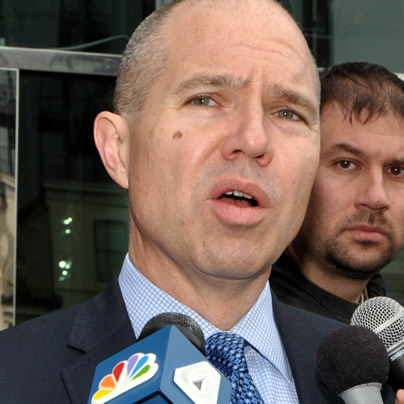
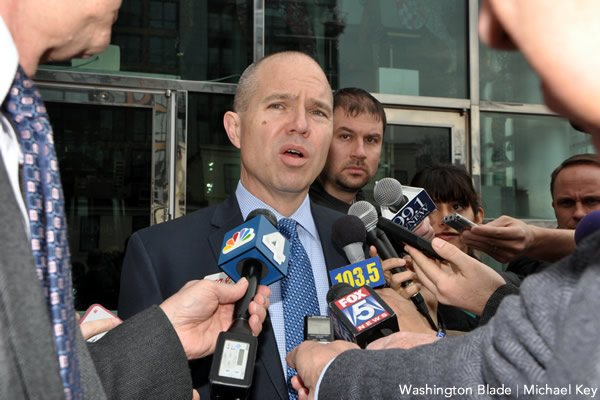
David Catania is the first serious openly gay contender for the office of D.C. mayor. (Washington Blade photo by Michael Key)
D.C. Council member David Catania (I-At-Large) filed papers on Wednesday to become a candidate for mayor in the November general election, saying he has the “values and the vision and the tenacity” to tackle the challenges facing the city.
As a 16-year veteran on the Council with a long record of legislative accomplishments, including his role as author of the city’s historic marriage equality law, Catania becomes the first serious openly gay contender for the office of D.C. mayor with a shot at winning.
“This is a city that believes strongly in equality of opportunity, a strong sense of fairness and the importance of playing by the rules,” Catania said at a news conference outside the city’s Reeves Center municipal building, where he registered his candidacy.
“These are the values we all share and these are the ones that have guided me since I was elected,” he said.
In what many LGBT activists will likely view as a twist of fate, a large segment of the city’s LGBT community has already lined up behind the re-election campaign of Mayor Vincent Gray, who they consider the most LGBT-supportive mayor in the history of the city.
The potential dilemma of LGBT voters having to choose between an out gay candidate with a longstanding record of support on their issues and a pro-LGBT mayor they consider a longtime friend and ally was likely heightened on Wednesday when Catania reiterated his call for Gray to resign.
When asked by reporters at his news conference what he thought about revelations by the U.S. Attorney earlier this week that Gray was aware of an illegal “shadow campaign” orchestrated by businessman Jeffrey Thompson to benefit Gray’s 2010 mayoral campaign, Catania said he believes the allegations to be true.
“I made my feelings known about the mayor’s shadow campaign when it was first disclosed nearly two years ago,” he said. “I said he should have resigned then and I believe that today.”
Catania, however, said the timing of his declaration of candidacy for this week was set in motion over a week ago, before the revelations of the U.S. Attorney were known, when he set up a campaign bank account that required him to formally enter the race this week.
Catania said he’s ready to run against Gray or any of the other seven Democrats challenging Gray in the city’s April 1 Democratic primary, including four of Catania’s Democratic colleagues on the Council.
In response to questions by reporters, Catania said he’s not at all deterred by the fact that he’s an independent and former Republican running in a city with an overwhelmingly Democratic electorate. No non-Democrat has ever won election as mayor in the District of Columbia.
“I want to be as clear as I can be,” he said. “I won more citywide races than everyone else in the race combined. I’ve won five times citywide. I’ve represented every corner of the city since 1997.”
Catania added, “I believe I have the values and the vision and the tenacity to tackle the challenges facing the city and I have the record of accomplishments that supports it. So I’m not worried about who prevails in the Democratic primary. I’ve got a record that I’m very proud of and that I’m very excited to share, and I’m very excited to talk about my vision for the city.”
The most recent poll on the Democratic primary, which was conducted before the latest revelations about Gray’s alleged 2010 shadow campaign, show Gray leading his closest rival, Council member Muriel Bowser (D-Ward 4), by a margin of 28 percent to 20 percent. Council members Jack Evans (D-Ward 2), Tommy Wells (D-Ward 6), and Vincent Orange (D-At-Large), were trailing with 13 percent, 12 percent and 4 percent respectively.
Businessman Andy Shallal had 6 percent, attorney and former State Department official Reta Jo Lewis had 3 percent, and civic activist Carlos Allen had less than 1 percent.
Political observers, including Bob Summersgill, former president of the Gay and Lesbian Activists Alliance, said that if Gray squeaks out a victory in the primary with around 30 percent of the vote or less, many of the Democratic voters that backed his rivals could turn to Catania in the November election.
When asked by the Blade where he thinks the LGBT vote would go in the general election, Catania said he believes he would be a strong contender for that vote based on his record on a wide range of issues.
“I think people are going to vote their interests and their values,” he said. “And I hope we can refrain from having constituency voting blocs. I don’t think that’s good for anybody.”
But he added, “I’m happy to put my record as an LGBT advocate against anyone. I hear in these forums how everyone takes responsibility and credit for same-sex marriage. But I was there. I know members who never showed up for the hearings and never said a word on the dais,” he said.
“I know the difference between those who have revisionist history and those who were there,” he said. “And so whether it’s having been the first openly gay elected member of the Council, from championing everything from HIV education and treatment to same-sex marriage to adoption to transgender rights, I’ll put my record against anyone’s.”
When asked about a recent independent report indicating shortcomings in the D.C. Police Department’s handling of anti-LGBT hate crimes, Catania praised Police Chief Cathy Lanier but said he would not discuss personnel issues before the election.
“I think Cathy Lanier has been an excellent chief,” he said. “Now we can all do better and learn from our mistakes…[T]here’s always room for improvement both in terms of the reaction of the LGBT community, internal affairs and others,” he said.
A partial transcript of Catania’s news conference follows:
Reporter: So you just filed your papers today to run?
Catania: Actually, this has been in the works for some time. We decided in January that this would be the week we would announce. In fact, just last Wednesday, before any of the latest revelations came out, we opened our bank account and by law we have five business days to file. And so last Wednesday we opened our bank account, always with the intention of filing this week. And of course you know what has happened in the intervening time known to all of us.
Reporter: What do you think about what’s happened with the mayor this week?
Catania: Well, I made my feelings known about the mayor’s shadow campaign when it was first disclosed nearly two years ago. I said he should have resigned then and I believe that today.
Reporter: What is your path to victory at this point? Does the mayor have to win the primary?
Catania: No. I want to be just as clear as I could be. I won more city wide races than everyone else in the race combined. I’ve won five times citywide. I’ve represented every corner of the city since 1997. I believe that I have the values and the vision and the tenacity to tackle the challenges facing the city and I have the record of accomplishments that supports it. So I’m not worried about who prevails in the Democratic primary. I’ve got a record that I’m very proud of and that I’m very excited share and I’m very excited to talk about my vision for the city.
Reporter: This is a city that remains hugely Democratic.
Catania: That’s right. And I would be delighted to put my record against any of those who have Democrat by their name as it relates to democratic values. I think my record more embodies democratic values than the field of candidates running as Democrats. If you look at what I’ve done for marriage equality, medical marijuana, smoke free D.C., cutting the rate of uninsured children and adults in half in this city, my work with HIV, and most recently my work with respect to education, including a fair funding bill which is finally going to give the resources for poor kids to catch up. And so labels are fine but I think the people are looking for a leader who’s actually delivered. And there’s one thing I can say – I’ve delivered.
The others have talked a good game and good for them for having labels. But I’ve actually delivered.
Reporter: You’re a former Republican and you’re also a white person. How does that play into the racial mix of this city?
Catania: Well I think the citizens of this city want a leader that shares their values. And it doesn’t matter what label you have. Clearly I do. This is a city that believes strongly in equality of opportunity, a strong sense of fairness and the importance of playing by the rules. These are the values we all share and these are the ones that have guided me since I was elected. So with respect to labels, you know, I think they may matter with some but by and large if you look at where we are in the city and if we’re going to secure our future we need a leader who shares our values, has a vision, and has the tenacity to get the job done.
Reporter: Your campaigns have actually taken money from Jeffrey Thompson and then I guess you had a really serious falling out with him. Would you give back the money you took from Jeffrey Thompson or did you give the money back?
Catania: You know, Mr. Thompson held a fundraiser for me in 2006. And so the bulk of the funds that were raised through that fundraiser were in 2006. Unfortunately, as you know, we, unlike federal campaigns, we close each of our campaigns out – by law we’re required to – at the conclusion of the election. So the money has simply been closed out. Now the money – whatever was left over – went to a constituent services fund. And so it’s not like I have additional monies lying around to do that. And I think we’re prohibited by law from taking our existing campaign funds to pay back the debts of another campaign.
Reporter: Were you the chairman of the Health Committee when the agreement to give Jeffrey Thompson more money signed out? You fought that, didn’t you?
Catania: I think what’s interesting is that we’re here today because of the work of the Committee on Health when I became chairman. In 2005 when I became chairman of the committee the first thing I wanted to do was kind of survey the landscape of the area of responsibility that I had, which included the city’s three largest contracts for managed care and for Medicaid. And so I actually put the money in in 2005 to conduct an audit of our three managed care organizations, including Jeff Thompson’s. That audit is what ultimately led to Mr. Thompson having to settle with the city with $17 million in 2008. So it’s not about having a falling out one way or another. I was doing my job. I wanted the city’s largest contracts to be subject to an audit. They were. It demonstrated that he was helping himself, candidly, and that resulted in him having to pay some money back. I suspect that’s part of what inspired him to try to find leaders that were more malleable. I wasn’t one of them.
Reporter: The mayor calls him a liar. He says everything he says is a lie, lie, lie.
Catania: Well I think this whole subject, this whole drama we’ve had with Jeff Thompson – this great drama – the time has come for this to end. And you know we need to be talking about how we’re going to make sure our kids are ready to succeed. We need to be talking about an affordable housing plan and a public safety plan of action for Fire and EMS. The less we talk about Vince Gray and Jeff Thompson the better. That’s for others to talk about. I’m talking about my vision for the city, which doesn’t include serving as a human lie detector for Jeff Thompson or Vince Gray.
Reporter: What about this settlement. Did you think that settlement that was reached with Chartered Health was good and above board or did you think —
Catania: Which settlement, the first one or the second?
Reporter: The one that was agreed to [by the city] and paid him.
Catania: This was obviously an attempt to square accounts with the shadow campaign as far as I am concerned. It was laid out as meticulously as it could be. Jeff Thompson in 2008 had to pay $12 million because he stole from the city. And then two weeks after he wins his primary his group begins putting in motion the very settlement that ultimately, that Mayor Gray advanced – that we paid him the money from the false claims actions against the city. Do I believe the mayor knew it and participated and do I believe the city actually paid the shadow campaign money back? Yes, I believe that…
Reporter: You have a reputation for being a little difficult. I won’t even say the words that some – [Tom Sherwood interrupts: The Rahm Emanuel of D.C.?]
Catania: Well listen, we’re not cutting the crusts off cucumber sandwiches here. This is not a garden party. This is about running a $12 billion organization where the lives of 640,000 people depend on someone being honest, having values and a vision and being faithful to those values and those visions. And so I’m not going to apologize for the passion that I take to this job. I think most of us are outraged when they have Fire and EMS officials just standing by while our citizens are in harm’s way. I think most of our citizens are outraged when they see half of our African American males not graduating on time for high school. I think most of our citizens are outraged when they see our homeless in rec centers. So I’m not going to apologize for that outrage. I’m not going to apologize for the passion. It’s helped me get though some of the toughest measures in the last 15 years, 16 years on the Council…
Reporter: Concerning the police department, there was an independent report that just came out saying there are some shortcomings in their handling of hate crimes and that the chief may have caused the Gay and Lesbian Liaison Unit to not be able to do its job as well as it could. If you were elected, have you decided whether you would retain the police chief?
Catania: Look, I think Cathy Lanier has been an excellent chief. Now we can all do better and learn from our mistakes. But I want to make clear I’m not talking about personnel decisions until after the election. It is the right of every mayor to select those individuals that he or she wishes to work with. I think that Chief Lanier has been an excellent chief but there’s always room for improvement both in terms of the reaction of the LGBT community, internal affairs and others.
Reporter: We’re now in the primary. Will you be out campaigning or will you wait to see who wins the primary?
Catania: No, the race starts today, Tom. The race starts today.
…If we’re electing leaders rather than administrators I think it’s time for people to look at the record. And among those who are running for mayor if you look at what have they done in the last 15 months. I think that’s a fair subject for discussion and it’s what I intend to talk about during this race. But look, it isn’t about who the Democratic nominee might be. I have an affirmed agenda that I believe is consistent with the values of our residents. I think we can do better. We have incredible fundamentals. When I look at our economy and I look at the values of our citizens and we have yet to capture the entire trajectory, the entire direction of those values…
Reporter: The leading candidates in the Democratic primary are all very supportive on LGBT issues. The mayor says he’s very supportive. Whoever wins the primary, how do you think the LGBT vote will go in the general election?
Catania: Lou, I think people are going to vote their interests and their values. And I hope we can refrain from having constituency voting blocks. I don’t think that’s good for anybody. I’m happy to put my record as an LGBT advocate against anyone. I hear in these forums how everyone takes responsibility and credit for same-sex marriage. But I was there. I know the members who never showed up for the hearings and never said a word on the dais. I know the difference between those who have revisionist history and those who were there. And so whether it’s having been the first openly gay elected member of the Council, from championing everything from HIV education and treatment to same-sex marriage to adoption to transgender rights, I’ll put my record against everyone’s or anyone’s.
Reporter: Can you say something about the EMS?
Catania: You know, I’m very open to the idea of separating the EMS and putting it candidly under the Department of Health because I see the EMS as the front line of the Department of Health. These are the front line deliverers of health services. The way it has been organized, specifically it’s been subsumed by the Fire Department and has not been able to stand on its own. And so I’m open to the idea of separating the two…
Reporter: Would you retain Chief Ellerbe as fire chief?
Catania: No. I’ll make an exception because that’s so glaring.
Reporter: How do you assess your chances?
Catania: Good.
Reporter: Why do you think they’re good?
Catania: Well I think this is an election about change. I think the electorate is eager to have a leader instead of an administrator and I think the work that I’ve done touches many constituencies across the city. Who else can claim that they saved our public hospital? Who else can lay claim to a marriage equality bill that finally made all of our families equal before the law? Who else can claim that they produced the lowest rate of uninsured children in the country? Who else championed medical marijuana or the most comprehensive mental health system for young people in the country? So I think it’s time to ask some of those who are running on the inertia of a label why they believe they have a chance of winning having accomplished so little.
District of Columbia
LGBTQ voters divided in Ward 8 special election
All four candidates on DC Council seat ballot are allies

Political observers, including LGBTQ activists, believe LGBTQ voters in Ward 8, like most if not all voters in the ward, are divided over which of the four candidates to support in the July 15 special election to fill the ward’s vacant D.C. Council seat.
Each of the four candidates, all of whom are Democrats, including ousted Ward 8 council member Trayon White, who is running to recapture his seat, have expressed support for LGBTQ related issues.
The special election was called earlier this year after the D.C. Council voted unanimously to expel White following his indictment and arrest by the FBI on a federal bribery charge in August 2024.
He has pleaded not guilty to the charge and under D.C. law he can legally run for and regain his council seat until the time he is convicted of the charge. His trial is scheduled to begin in January 2026.
The three candidates challenging White — Sheila Bunn, Mike Austin, and Salim Adofo — are longtime Ward 8 community advocates who have been involved in local government affairs for many years and, according to LGBTQ activists who know them, have been supportive of LGBTQ rights.
White also has a record of supporting LGBTQ issues while serving on the council since 2017. Following his indictment, he won re-election by a wide margin in the November 2024 general election against a lesser-known Republican opponent.
Political observers say White’s indictment on a bribery charge is likely to alienate some of his past supporters, but they say he remains popular in the ward, and with three candidates dividing the opposition vote he could win the election with less than 50 percent of the divided vote count.
Two of the candidates, Bunn and Adofo, responded to a request by the Washington Blade sent to each of the four candidates asking for a statement summarizing their positions on LGBTQ related issues. In their respective statements Bunn and Adofo expressed strong support on a wide range of LGBTQ issues.
“In my nearly 30 years of public service, I have consistently supported the rights and worked to improve the quality of life for the LGBTQIA+ community,” Bunn said in her statement. She noted that much of her work on behalf of LGBTQ rights took place when she served as chief of staff for D.C. Congressional Delegate Eleanor Holmes Norton and as a senior staff member for former D.C. Mayor Vincent Gray.
In his statement, Adofo said he advocated for a wide range of LGBTQ issues, including housing programs for homeless LGBTQ youth and supportive employment training programs for transgender residents.
“At the heart of our platform is a steadfast commitment to uplifting LGBTQ+ communities, ensuring that policy is shaped not just for them, but with them,” his statement says. Adofo’s positions in support of LGBTQ rights are also posted on his campaign website.
GLAA D.C, formerly known as the Gay and Lesbian Activists of Washington, released its ratings of three of the four candidates on June 22, based on its recent policy of basing its ratings mostly on non-LGBTQ specific issues. The group rates candidates on a scale of -10, the lowest possible rating, to +10, its highest rating.
It assigned a rating of +7.5 for Bunn, +6.5 for Austin, and +4.5 for Adofo. In a statement accompanying its ratings, GLAA said each of the three have a record of support on LGBTQ issues, but they lost rating points for not supporting non-LGBTQ related issues deemed important by GLAA.
GLAA said it did not issue a rating for White based on its policy of not rating candidates who are removed from office or resign due to allegations of ethics violations.
The Capital Stonewall Democrats, D.C.’s largest local LGBTQ political group, chose not to make an endorsement in the Ward 8 special election.
“We thought that this is best because this is a special election and in these unfamiliar times, we decided not to take a stand,” Howard Garrett, the group’s president, told the Blade.
Ward 8 gay Democratic activist Phil Pannell is supporting Adofo, he told the Blade, on grounds of Adofo’s strong support on LGBTQ issues and Adofo’s role as the only candidate in the Ward 8 special election who supported Initiative 83, the ballot measure passed by D.C. voters in November 2024 calling for a ranked choice voting system and open D.C. primaries. A lawsuit challenging the initiative filed by the D.C. Democratic Party has delayed its implementation.
Another longtime Ward 8 gay Democratic activist, David Meadows, is supporting Bunn. Meadows cites Bunn’s support for LGBTQ rights and her positions on other issues he supports as his reason for backing her candidacy.
The D.C. Board of Elections website shows that the board mailed ballots for the special election to all Ward 8 registered voters. The website shows that as of July 7, 2,483 voters sent back their ballots by mail or placed them in drop boxes located throughout the ward.
Early in-person voting at several polling places was scheduled to begin July 11, the website says, prior to the official election date of July 15 at all polling places throughout the ward.
Salim Adofo statement on LGBTQ issues:
Our campaign is rooted in the belief that everyone deserves to live with dignity, security, and opportunity. We are committed to building a safer, healthier, and more equitable District for all — where every voice is heard and every community is empowered. At the heart of our platform is a steadfast commitment to uplifting LGBTQ+ communities, ensuring that policy is shaped not just for them, but with them. We recognize that the fight for equity is interconnected, and we prioritize action in the areas that most deeply impact our residents’ daily lives. As [a] council member, I will advocate for healthcare for all, boost funding for HIV/AIDS, Hepatitis, STD, and TB Administration (HAHSTA) programs to address disparities in health outcomes.
• Expand access to care by exempting digital-only telehealth services from the Certificate of Need (CON) process and increasing funding through the Department of Behavioral Health (DBH).
• Build a culturally competent workforce by removing licensure barriers and expanding the pipeline of LGBTQ+ mental health providers.
• Employment and economic equity: sustain workforce development efforts like Project LEAP, a successful investment in economic empowerment for TGD residents.
• Foster public-private partnerships by requiring D.C. HR to work with labor unions and local employers to host trans-affirming job fairs.
• Fund community-led training by supporting programs developed by TGD organizations, modeled after California’s Transgender Economic Empowerment Initiative.
• Housing with dignity: every LGBTQ+ resident deserves stable, affirming, and permanent housing. End youth homelessness with a community-centered strategic plan focused on expanding permanent housing and wraparound services.
• Support inclusive housing by continuing funding for LGBTQ+ housing vouchers and senior housing initiatives.
• Safety and community support: create safe shelters by investing $2 million in a 20-bed LGBTQIA2S+ shelter for survivors of intimate partner violence and sexual assault.
• Empower community organizations with no-cost capacity-building support and streamlined access to D.C. grants for LGBTQ+-serving CBOs.
Sheila Bunn statement on LGBTQ issues:
In my nearly 30 years of public service, I have consistently supported the rights and worked to improve the quality of life for the LGBTQIA+ community.
As chief of staff to Congresswoman Eleanor Holmes Norton, I helped prevent Congress from overturning the District’s 2009 marriage equality bill and worked on removing congressional riders from the District’s budget that prohibited the expenditure of locally raised funds for our needle-exchange program, which has been pivotal in HIV/AIDS prevention.
As part of Mayor Vincent C. Gray’s senior staff, I assisted in launching the District’s transgender employment initiative under the Project Empowerment Program, increasing training and job opportunities for transgender residents. We also employed a member of the transgender cohort in the Mayor’s Office of Community Affairs after their tenure, demonstrating our commitment to the program. I facilitated efforts to end health insurance discrimination based on gender identity with DISB’s 2013 bulletin, ensuring coverage for services like mastectomies and hormone replacement therapy. Additionally, I helped to coordinate Mayor Gray’s first LGBTQIA+ Youth Town Hall to address the concerns of LGBTQIA+ youth and participated in cultural competency training to better support the District’s significant LGBTQIA+ population.
Currently, I am a member of the Capital Stonewall Democrats, actively engaging in Pride events and supporting LGBTQIA+ causes like the DC LGBTQ+ Community Center, a one-stop shop for services and programs with critical social service partners. Through direct outreach to organizations serving the LGBTQIA+ community, I aim to understand and represent their issues effectively. I look forward to collaborating with GLAA, Capital Stonewall Democrats, and other allied organizations to shape legislation and policies that benefit our LGBTQIA+ residents and all District residents.
Virginia
Defying trends, new LGBTQ center opens in rural Winchester, Va.
‘It has taught me that I am not alone in this place’
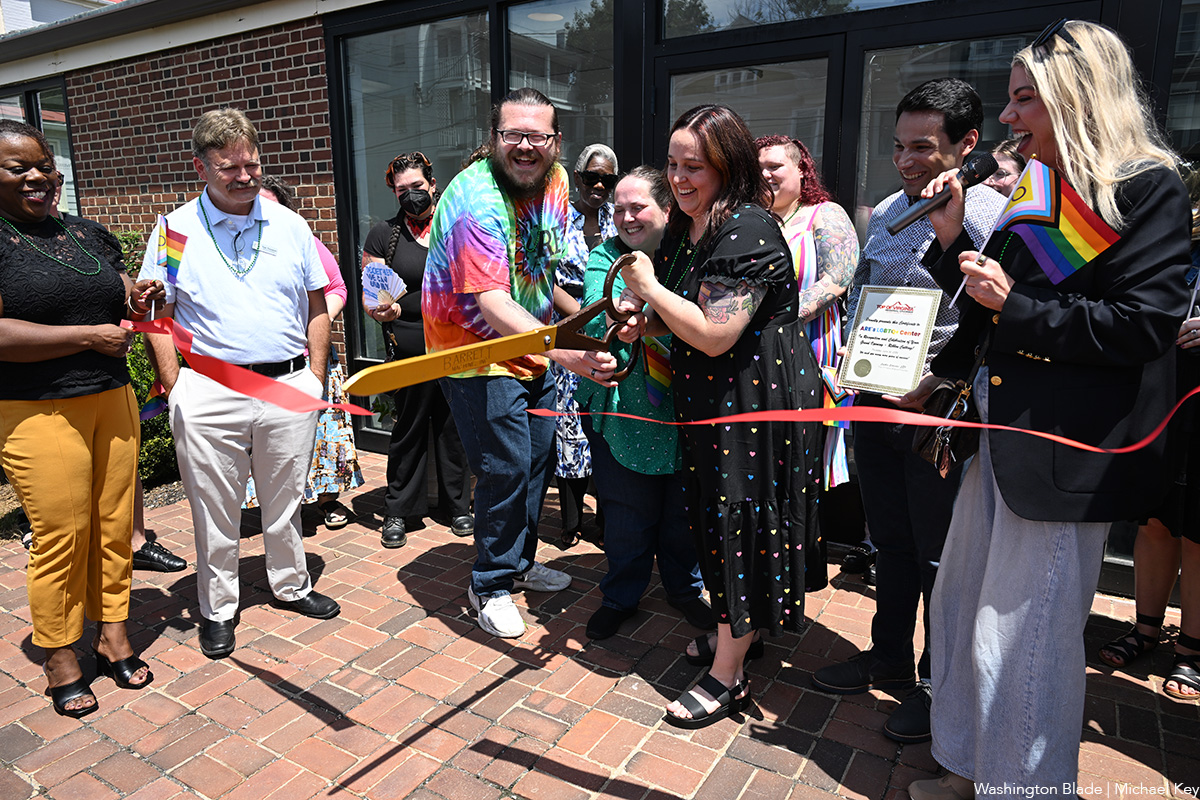
A new LGBTQ community center celebrated its grand opening on June 30 in Winchester, Va., defying recent trends amid a federal crackdown on DEI and LGBTQ funding.
The local HIV/AIDS service organization AIDS Response Effort, Inc. (ARE) worked with a team of volunteers to open the area’s first physical center.
ARE’s R.I.S.E. (Resources, Inclusion, Support and Empowerment) Center, located near the heart of Old Town Winchester on West Piccadilly Street, is more than a renovated bank building to the local LGBTQ community. The empty teller window on the side of the structure and converted vault inside give away the building’s past. But the volunteers, program participants, and well-wishers gathered at the ribbon-cutting ceremony tell the Blade that they are hopeful for a thriving future for the building — and the community.
The Washington Blade spoke with the executive director of ARE as well as the co-directors of ARE’s R.I.S.E. Center during a tour of the facility ahead of the opening.
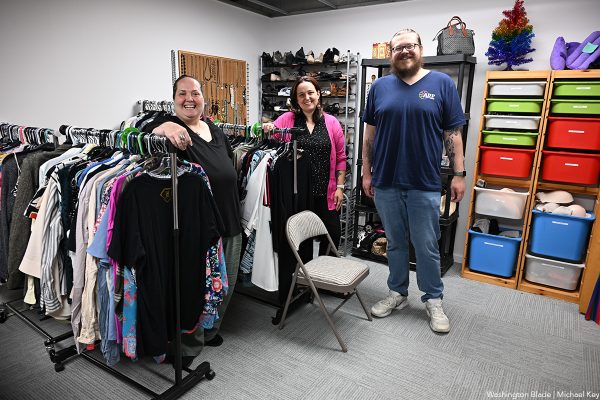
Katy Vance, executive director of ARE told the Blade, “I started [at ARE] about five years ago and we were an AIDS service organization, we have been for about 35 years now. We started as a group of volunteers out at the hospital —with Valley Health, and we’ve grown into a program that provides HIV case management for folks living with HIV in the community.”
Vance explained that as community needs have changed for service organizations like ARE, it has led to some soul-searching among advocates.
“We had this big meeting about, ‘who are we?,’ ‘who do we want to be?,’ ‘who do we want to be in a few years?,’” Vance recalls. “As things shift and change with HIV … we have a lot of folks that come into our office who are newly diagnosed. They will get connected to a medical case manager, they’ll get on medication, and they are undetectable within one to two months, which means they are untransmittable, which is amazing.”
“So, science and technology has come so far,” Vance continued. “And so, who are we when this tends to go in the direction of no longer being the major epidemic it has been for the last 40 years, right?”
“But, when I came in, we also had a general housing program for anyone in the community,” Vance said. “That was confusing for a lot of people who came into our doors trying to figure out who we were and what we are. We called it, our ‘identity crisis,’ essentially.”
“Are we an HIV service organization? Are we a housing program?” Vance asked. “So we worked with our local Goodwill and the board got together and we decided to transition our housing program out and we realized we wanted to open an LGBTQ center.”
“We have had a little bit of pushback as to why an HIV agency is opening a center,” ARE’s R.I.S.E. Center Co-Director Matt Buracker said. “Obviously, HIV and LGBT identities have a long history and a lot of stigma, but we felt like it was kind of irresponsible to talk about one without talking about the other. And we’ve always been supporting the LGBT community, so we’re just expanding our services to encompass more.”
The center seeks to serve the LGBTQ community in a county that Donald Trump carried with more than 63% of the vote in the 2024 election. While ARE receives state and federal grants for its operations, the LGBTQ center is currently funded by community donations and a founders’ campaign and is staffed with volunteers.
Vance tells the Blade that the Center met its initial fundraising goal of $50,000 very quickly. The building housing the center was renovated with a combination of grants, donations and volunteer work.

“I think our fundraising goals now are going to be more programmatic so that we can do the things that we want to do,” R.I.S.E. Center Co-Director Mary Bohacek said. “Because Matt and I are great at finding things to do for free. But there are other things that people are asking us to do, craft events or things that aren’t free to do. Eventually, we might need a license if we want to do movie screenings. So there is always going to be a fundraising need to fund the programming, but the building has been a huge success.”
“The support from the community has been overwhelming,” Buracker told the Blade. “We’ve had such a positive response from the community and it’s just it’s been so emotional to see that the need has been here and we are the one to finally do something about it.”
Vance interjected, “And of course, there are community members that aren’t a fan that are ‘keyboard warriors’ that are coming out saying stuff. What is amazing is: we had an article in the paper and they put it up on their Facebook page and people were making just terrible comments. But then, we got new volunteers from that. The community support has been, like Matt said, amazing and overwhelming.”
ARE’s R.I.S.E. Center is a member of CenterLink, a community of LGBTQ centers. Other LGBTQ community centers in the wider region include the Roanoke Diversity Center in Roanoke, Va, the Shenandoah LGBTQ Center in Staunton, Va., Diversity Richmond in Richmond, Va., NOVA Prism Center in McLean, Va., the DC Center for the LGBT Community in Washington, D.C. and the Frederick Center in Frederick, Md. A new MoCo Pride Center is scheduled to open in Bethesda, Md. in August.
While the physical building opened to the public on June 30, the R.I.S.E. Center in Winchester has held events for more than a year.
“We’ve had programming going on for almost two years now,” Bohacek told the Blade. “Our first event was a ‘Friendsgiving.’ There were so many people that showed up that we literally didn’t have enough space: we needed to knock down walls.”
The staff and volunteers at ARE and the nascent Center used that momentum to foster the growth of affinity groups, community groups and services.
Affinity groups are described as “not just support groups or social groups, but rather as something of a hybrid between the two.” As Bohacek says about the affinity groups, “if someone needs community or needs a place to talk about queer issues, they have a space to do that.”
Affinity groups hosted by the Center include a group for trans and gender non-conforming people, a group for the families of trans people, a polyamorous affinity group, an aro-ace group, a “Rainbow Connection” all-purpose group, and a “Gay-RP” affinity group for people 50 and older.
“We also have a young adult group, which is for ages 18-25, which is one of the more vulnerable sections of our community,” Bohacek said. “So we want to make sure that they have places to connect.”
As reported in the Blade, the youth advocacy organizations Hopelab and Born this Way Foundation recently issued a report that suggests LGBTQ youth (ages 15 to 24) living in rural communities face greater challenges than their suburban or urban peers in dealing with their sexual orientation or gender identity, though have significantly benefited from online resources.
“We also have some community-wide programming that allies are welcome attend,” Bohecek said. Programming includes a monthly game night, a volunteer night for the many Center volunteers, as well as the “stitch and bitch” group, who “sit, crochet, embroider and talk.”
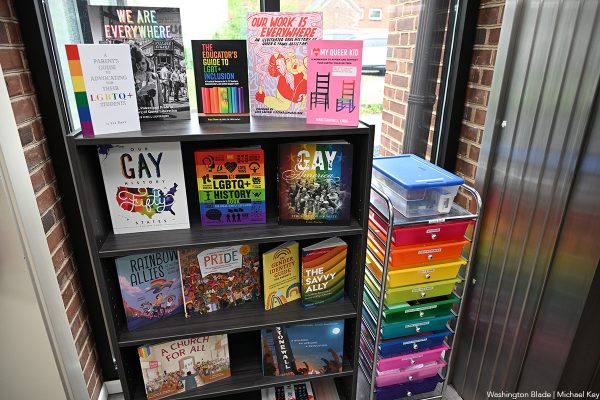
“And Coffee and Coloring!” Bohecek exclaims. “That’s one of my favorites. We like to say it’s about — just sit down, relax, have a cup of coffee — but frankly it’s about community building.”
Bohacek proudly lists the many other services the center offers, including a transgender/gender-affirming closet, which is currently overflowing with donations of clothes.
“We also have an amazing library of all kinds of identities and all kinds of ages for people to come and see,” Bohacek told the Blade. “This building is actually an old bank, so we put our books into the vault.”
The old bank, now vibrant community center, was filled to capacity for the official opening ceremony on a hot Monday afternoon in late June. People from across the Shenandoah Valley who had come to the ribbon-cutting event snacked on rainbow-colored cupcakes as they toured the renovated building.
“To be a gay man growing up in a small, rural area . . . we didn’t have anything like this,” Front Royal, Va. resident Ed McKee told the Blade. Though he lives in a town a few miles away, he works at a salon in Winchester and had come to see the new center opening.
“We didn’t have anything like this when I was growing up,” McKee said as he gestured toward the packed LGBTQ community center. “If we had, it would have made my life so much easier. I probably would have come out sooner — I didn’t come out until I was about 30 — because I would have felt the support, you know?”
“Especially now with everything that is going on in our country,” McKee continued. “We need to show strength in numbers: come together. And the center is allowing for that to happen.”
McKee’s husband, Winchester business owner Paul Miller, agreed.
“I’m hoping that [the Center] can be a great way to connect with people who might not otherwise understand how they can come together,” Miller told the Blade. “And I’m hoping that, while I’m not sure that this is its mission, I’m hoping that it has a political effect in Virginia.”
Members of the community who came to witness the opening gathered outside of ARE’s R.I.S.E. center for the ribbon cutting. Speakers at the ceremony included the Center’s co-director Bohacek.
“Today, we’re celebrating the renovation of the building,” Bohacek began. “But, we’re also celebrating the rise of this community.”
“This community has taught me resilience and it has taught me friendship and it has taught me that I am not alone in this place,” Bohacek told the crowd. “There are people that care. And we are so proud to have a place where we can be ourselves, where anyone and everyone is welcome — and we mean it. So, with that said, let’s keep on rising!”
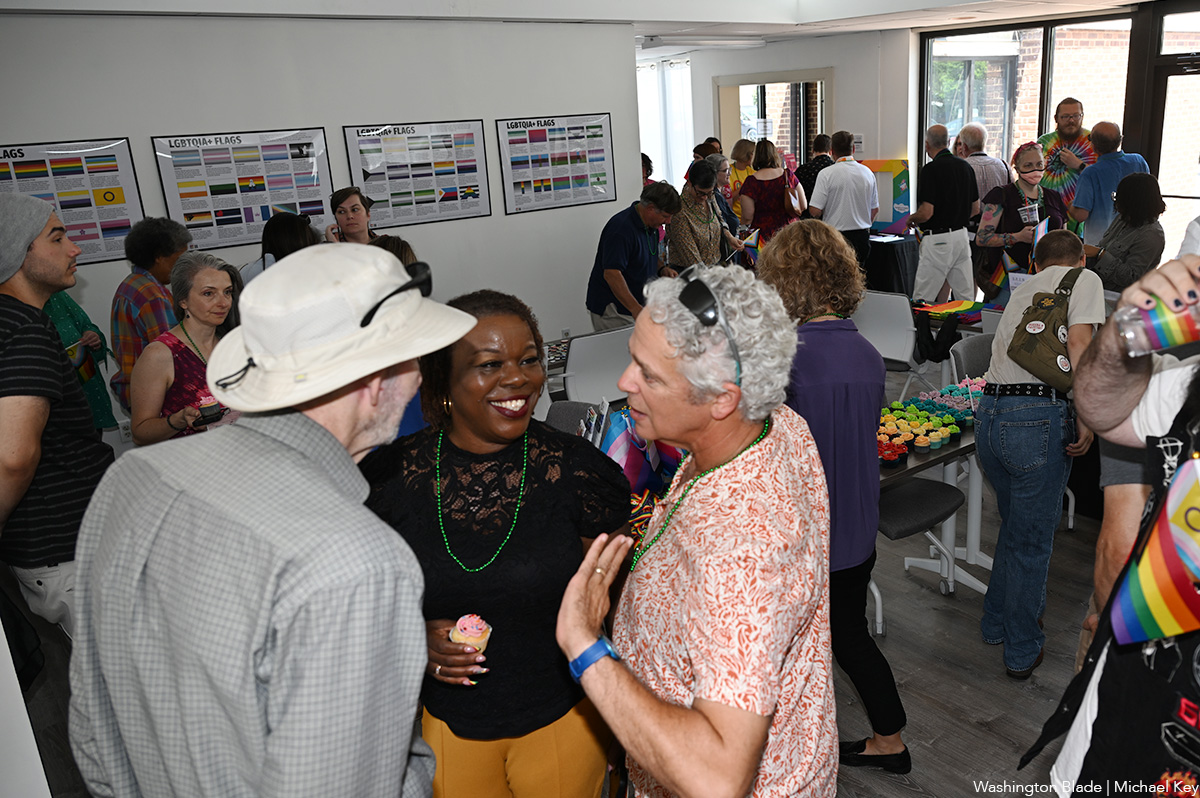
Maryland
Maryland’s oldest rural gay bar — and one of the last — is a log cabin in the woods
The Lodge is a Boonsboro watering hole resembling a log cabin
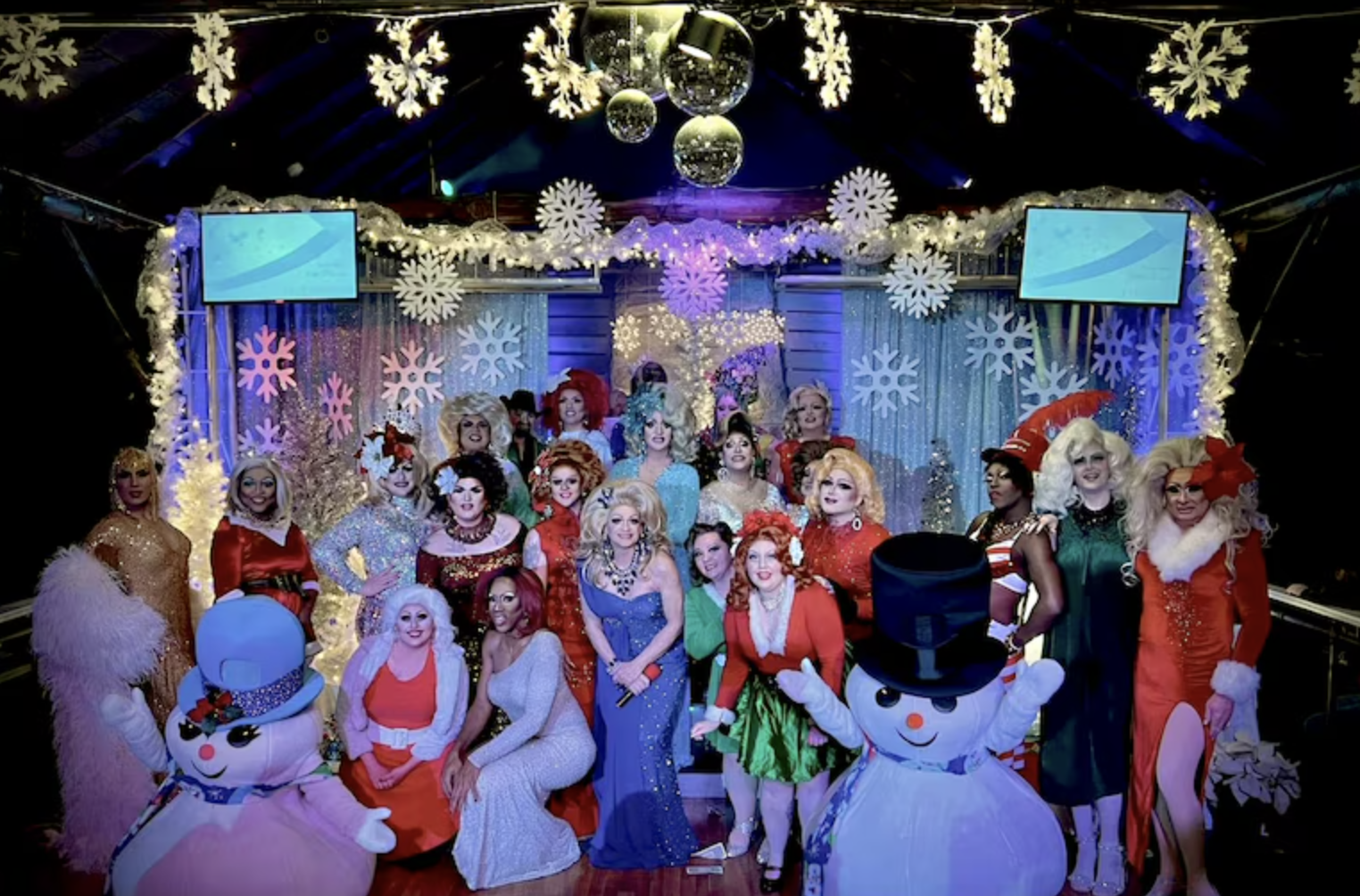
By SAPNA BANSIL | In the woods of a conservative Western Maryland town of fewer than 4,000 people is an unlikely landmark of state LGBTQ history.
The Lodge, a Boonsboro watering hole that resembles a log cabin, is Maryland’s oldest rural gay bar — one of a few remaining in the country, according to historians.
For about four decades, the Washington County venue has offered safety, escape and community to queer people far from large, liberal cities. Starting Friday night, The Lodge will close out Pride month with one of its biggest parties of the year: a weekend of dancing, drinking and drag in celebration of Frederick Pride, held about 20 miles away in the area’s largest city.
The rest of this article the Baltimore Banner published on June 27 can be read on its website.


















